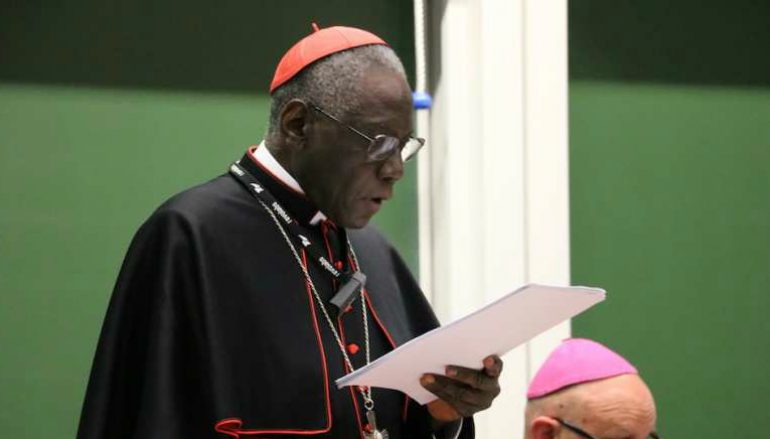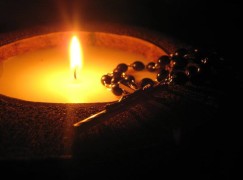

Starting this Advent, Vatican Liturgy Chief Calls On All Priests to Face East for Mass
Speaking at a conference on the liturgy in London this past Tuesday, Cardinal Robert Sarah, who is the Prefect of the Congregation for Divine Worship and Discipline of the Sacraments (the highest authority in the Catholic Church), under Pope Francis, asked all bishops and priests to adopt the ancient posture in the Mass where the priest faces the tabernacle along with the congregation, rather than facing the people. He asked that the posture be adopted by Advent of this year, which begins November 27. Cardinal Sarah also encouraged all Catholics to receive Communion while kneeling.
The Catholic Herald deputy editor, Dan Hitchens, recognized this as “the biggest liturgical announcement since Benedict XVI’s 2007 motu proprio Summorum Pontificum gave greater freedom for priests to celebrate the Traditional Latin Mass.”
Cardinal Sarah said, “Our Holy Father Pope Francis has the greatest respect for the liturgical vision and measures of Pope Benedict” and the pope asked Cardinal Sarah to “continue the liturgical work Pope Benedict began.”
While giving thanks for the many devout celebrations of the liturgy throughout the world, Cardinal Sarah the many abuses of the liturgy that are far too common. “In recent decades,” he observed, “we have seen many liturgical celebrations where people, personalities and human achievements have been too prominent, almost to the exclusion of God.”
One such abuse he mentioned was when priests “step aside to allow extraordinary ministers distribute Holy Communion” which for many priests was thought to be a way of allowing lay people to participate in the Mass in a substantial way. Rather, said Cardinal Sarah, “This is wrong, it is a denial of the priestly ministry as well as a clericalisation of the laity … When this happens it is a sign that formation has gone very wrong, and that it needs to be corrected.”
“I am an African,” Cardinal Sarah said. “Let me say clearly: the liturgy is not the place to promote my culture. Rather, it is the place where my culture is baptised, where my culture is taken up into the divine.”
Sarah suggested that the Fathers of the Second Vatican Council intended liturgical reform to bring more of the faithful to the Mass, yet for the most part the effort has failed, as he said, “My brothers and sisters, where are the faithful of whom the Council Fathers spoke?”
The cardinal continued:
“Many of the faithful are now unfaithful: they do not come to the liturgy at all. To use the words of St John Paul II: many Christians are living in a state of ‘silent apostasy;’ they ‘live as if God does not exist’ (Apostolic Exhortation, Ecclesia in Europa, 28 June 2003, 9). Where is the unity the Council hoped to achieve? We have not yet reached it. Have we made real progress in calling the whole of mankind into the household of the Church? I do not think so. And yet we have done very much to the liturgy!”
Brian Williams over at Liturgy Guy, highlights 5 significant quotes by Cardinal Sarah during this “monumental” speech:
Ad Orientem beginning this Advent
“And so, dear Fathers, I ask you to implement this practice (ad orientem worship) wherever possible, with prudence and with the necessary catechesis, certainly, but also with a pastor’s confidence that this is something good for the Church, something good for our people. Your own pastoral judgement will determine how and when this is possible, but perhaps beginning this on the first Sunday of Advent this year, when we attend ‘the Lord who will come’ and ‘who will not delay’ (see: Introit, Mass of Wednesday of the first week of Advent) may be a very good time to do this. Dear Fathers, we should listen again to the lament of God proclaimed by the prophet Jeremiah: “they have turned their back to me” (2:27). Let us turn again towards the Lord!”
The Greater Use of Latin
“We must get the right balance between the vernacular languages and the use of Latin in the liturgy. The Council never intended that the Roman rite be exclusively celebrated in the vernacular. But it did intend to allow its increased use, particularly for the readings. Today it should be possible, especially with modern means of printing, to facilitate comprehension by all when Latin is used, perhaps for the liturgy of the Eucharist, and of course this is particularly appropriate at international gatherings where the local vernacular is not understood by many. And naturally, when the vernacular is used, it must be a faithful translation of the original Latin, as Pope Francis recently affirmed to me.”
Kneeling for Communion
“So too kneeling at the consecration (unless I am sick) is essential. In the West this is an act of bodily adoration that humbles us before our Lord and God. It is itself an act of prayer. Where kneeling and genuflection have disappeared from the liturgy, they need to be restored, in particular for our reception of our Blessed Lord in Holy Communion. Dear Fathers, where possible and with the pastoral prudence of which I spoke earlier, form your people in this beautiful act of worship and love. Let us kneel in adoration and love before the Eucharistic Lord once again!”
Silence within the Liturgy
“We must ensure that adoration is at the heart of our liturgical celebrations. Too often we do not move from celebration to adoration, but if we do not do that I worry that we may not have always participated in the liturgy fully, internally…If I am never silent, if the liturgy gives me no space for silent prayer and contemplation, how can I adore Christ, how can I connect with him in my heart and soul? Silence is very important, and not only before and after the liturgy.”
Sacred Liturgical Music
“Before I conclude, please permit me to mention some other small ways which can also contribute to a more faithful implementation of Sacrosanctum Concilium. One is that we must sing the liturgy, we must sing the liturgical texts, respecting the liturgical traditions of the Church and rejoicing in the treasury of sacred music that is ours, most especially that music proper to the Roman rite, Gregorian chant. We must sing sacred liturgical music not merely religious music, or worse, profane songs.”
Cardinal Sarah appealed:
“I want to make an appeal to all priests… I believe that it is very important that we return as soon as possible to a common orientation, of priests and the faithful turned together in the same direction—Eastwards or at least towards the apse—to the Lord who comes, in those parts of the liturgical rites when we are addressing God… I think it is a very important step in ensuring that in our celebrations the Lord is truly at the centre.
And so, dear Fathers, I ask you to implement this practice wherever possible, with prudence and with the necessary catechesis, certainly, but also with a pastor’s confidence that this is something good for the Church, something good for our people.”
Sunday, July 3, 2016 at St. Mary of Pine Bluff – Fr. John Zuhlsdorf (Fr. Z) offers the Novus Ordo Mass facing east (ad orientem)









